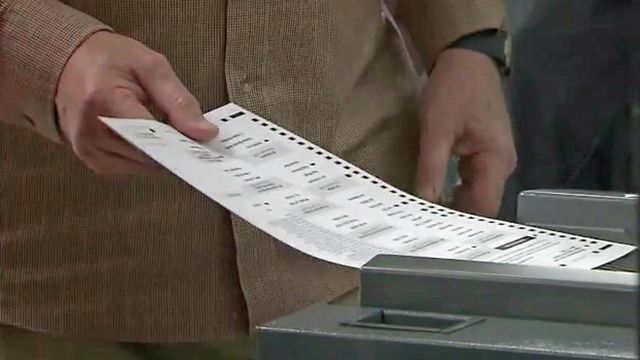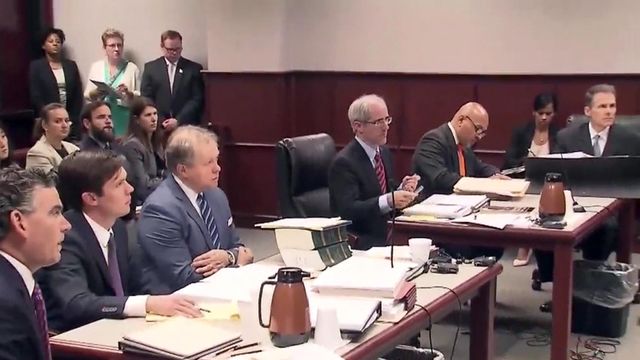Lawyers spar over whether proposed amendments are misleading
Lawyers representing Gov. Roy Cooper, the state NAACP and an environmental group argued Tuesday that four of the six proposed constitutional amendments on the ballot this fall are intentionally misleading and should be excluded.
Posted — UpdatedBut an attorney representing state lawmakers said there's no standard for what information goes on a ballot, so the General Assembly is within its right to present all six amendments to voters for approval.
Superior Court Judge Paul Ridgeway decided, after a three-hour hearing, to send the case on to a three-judge panel, which, by law, is supposed to hear constitutional challenges to the actions of the General Assembly. Judges Forrest Donald Bridges of Cleveland County, Thomas Lock of Johnston County and Jeffrey Carpenter of Union County were appointed to handle the case, but no date for a court hearing has been set.
- "Constitutional amendment to implement a nonpartisan merit-based system that relies on professional qualifications instead of political influence when nominating Justices and judges to be selected to fill vacancies that occur between judicial elections."
Currently the governor can fill judicial vacancies largely as he or she sees fit. This proposal would create a commission to vet candidates, then have the legislature forward two names to the governor, who would have to pick one of those two.
- "Constitutional amendment to establish a bipartisan Board of Ethics and Elections to administer ethics and election laws, to clarify the appointment authority of the Legislative and the Judicial Branches, and to prohibit legislators from serving on boards and commissions exercising executive or judicial authority."
This would replace the current State Board of Elections and Ethics Enforcement, which has been the subject of other lawsuits and the governor has a one-member advantage on, with a board made up of four appointees approved by the legislative majority and four by the legislative minority. It would also cement the legislature's disputed ability to take hundreds of other appointment powers from the governor and make those appointments itself.
John Wester, an attorney for Cooper, said calling the impact of the second proposal a clarification is "profoundly misleading," adding that voters would have no idea they would be dramatically shifting power from one branch of government to another by approving the amendment.
"The General Assembly should not be allowed, cannot be allowed to violate the rights of North Carolinians," said John Wester, an attorney for Cooper. "[Voters] can exercise their rights and power only if they are fairly and honestly informed about the amendment before them."
Cooper, a Democrat, has been fighting with Republican legislative leaders over appointment powers to various state boards and commissions since before he took office at the start of 2017.
"Both [amendments] take a wrecking ball to the constitution's separation of powers principle, and they would ... strip the governor of constitutional powers," Wester said.
Erik Zimmerman, another attorney for Cooper, argued that the judicial vacancies amendment has no basis in merit or professional qualifications other than what is already spelled out in law. He also derided the prospect that the new system would be nonpartisan.
"To give the General Assembly that degree of control over the process means that this is not a nonpartisan process," Zimmerman said. "What would appear on the ballot would amount to essentially a partisan argument in favor of the passage of this amendment. ... Partisan spin [and] argument don't have any place on a fair ballot."
Who's to say what's misleading? asked Martin Warf, an attorney for legislative leaders.
"Where is it that there is a standard to apply to the language on the ballot as to whether it accurately represents what's going on or not?" Warf said, adding that the constitution gives the General Assembly the authority to put proposed amendments to a public vote.
The commission still must write longer explanations for each amendment that won't appear on the ballot but will be available at each county board of elections for anyone who asks.
Warf maintained that information on amendments would be "absolutely available" to voters, so no one could say they didn't know what was going on.
Kym Hunter, an attorney for the Southern Environmental Law Center, which represents Clean Air Carolina, said Warf's argument is tantamount to lawmakers putting an amendment on the ballot promising everyone free ice cream sandwiches while in reality they planned to eliminate the Equal Protection Clause of the constitution.
- "Constitutional amendment to require voters to provide photo identification before voting in person."
This would add a photo ID requirement to the state constitution, with the legislature deciding after the amendment passes what sorts of IDs would be accepted. Republican leaders have called another General Assembly session for after the November elections, but before the new General Assembly elected in November is seated, to flesh that rule out, a maneuver Democrats have criticized as unfair.
- "Constitutional amendment to reduce the income tax rate in North Carolina to a maximum allowable rate of seven percent (7%)."
The current cap in the state constitution is 10 percent. The Southern Environmental Law Center, which along with other attorneys represents the NAACP and Clean Air Carolinas in this latest case, argues that the lower cap "could limit funding for programs in support of those living in poverty, civil rights, and environmental protection programs."
Hunter argued that the tax cap proposal is misleading because it suggests to voters that their taxes are being cut when passing the amendment would have no effect on income taxes because the current rate is far below 7 percent.
Meanwhile, the voter ID proposal contains no information as to what would be an acceptable form of identification, so voters can't really make an informed choice, she said.
"Does photo ID mean a U.S. passport? Does photo ID mean a Costco card? Does photo ID mean an expired student ID from 1957? We don't know what it means," she said.
The State Board of Elections and Ethics Enforcement, which is a defendant in both lawsuits, essentially agrees with the position that the amendments are misleading and shouldn't be put on the ballot as is.
State Solicitor General Matt Sawchak, who represented the elections board, said the board is tasked with ensuring the ballot is presented in a "readily understandable" and fair manner, and board members don't want to "be made a perpetrator" of any constitutional violation.
"The ballot that our voters will see in the booth has the aura that is has come from the government – it has official approval," Sawchak said. "It is a fundamental principle that our citizens have a right not to be misled by a ballot that has the aura of official approval."
"Consistent with the Agency's longstanding practice, our Board has not adopted a position on the merits while the Attorney General litigates the matter under his independent authority," Josh Lawson, general counsel for the elections board, later said in a statement.
"That unconstitutional body cannot have a role in rewriting the constitution of North Carolina to give itself more power when it is only there through illegal means," Hunter said.
But Phil Strach, a lawyer for the General Assembly, noted that courts also have allowed elections to proceed under the 2016 voting maps, so arguments that members of the legislature are wielding power illegally are baseless.
"The legislature can't be illegally constituted because a federal court allowed the legislature to be elected under the very districts they're complaining about, Strach said.
• Credits
Copyright 2024 by Capitol Broadcasting Company. All rights reserved. This material may not be published, broadcast, rewritten or redistributed.






